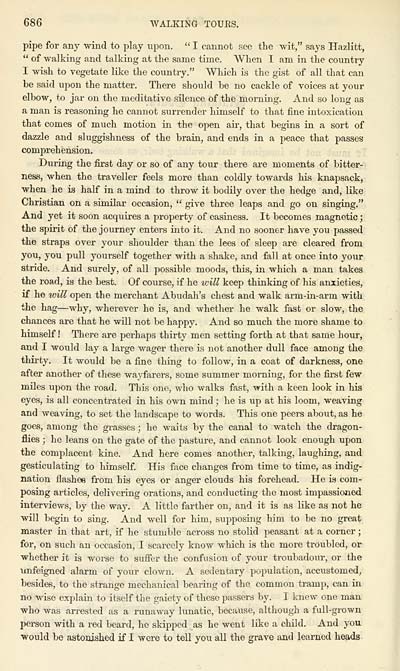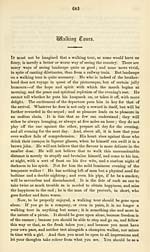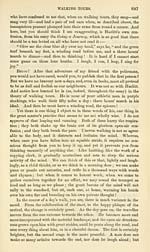Non-Fiction > Uncollected essays > Volumes 33-38, 1876-1878 - Cornhill magazine > Volume 33
(28) Page 686
Download files
Complete book:
Individual page:
Thumbnail gallery: Grid view | List view

686 WALKING TOURS.
pipe for any wind to jolay upon. " I cannot sec the wit," says Hazlitt,
" of walking and talking at the same time. When I am in the country
I wish to vegetate like the country." Which is the gist of all that can
be said upon the matter. There should be no cackle of voices at your
elbow, to jar on the meditative silence of the morning. And so long as
a man is reasoning he cannot surrender himself to that fine intoxication
that comes of much motion in the open aii', that begins in a sort of
dazzle and sluggishness of the brain, and ends in a peace that passes
comprehension.
During the first day or so of any tour there are moments of bitter-
ness, when the traveller feels more than coldly towards his knapsack,
when he is half in a mind to throw it bodily over the hedge and, like
Christian on a similar occasion, " give three leaps and go on singing."
And yet it soon acquires a property of easiness. It becomes magnetic ;
the spirit of the journey enters into it. And no sooner have you passed
the straps over your shoulder than the lees of sleep are cleared from
you, you pull yourself together with a shake, and fall at once into your
stride. And surely, of all possible moods, this, in which a man takes
the road, is the best. Of course, if he will keep thinking of his anxieties,
if he will open the merchant Abudah's chest and walk arm-in-arm with
the hag — why, wherever he is, and whether he walk fast or slow, the
chances are that he will not be happy. And so much the more shame to
himself ! There are perhaps thirty men setting forth at that same hour,
and I would lay a large wager there is not another dull face among the
thirty. It would be a fine thing to follow, in a coat of darkness, one
after another of these wayfarers, some summer morning, for the first few
miles upon the road. This one, who walks fast, with a keen look in his
eyes, is all concentrated in his own mind ; he is up at his loom, weaving
and weaving, to set the landscape to words. This one peers about, as he
goes, among the grasses ; he waits by the canal to watch the dragon-
flies ; he leans on the gate of the pasture, and cannot look enough upon
the complacent kine. And here comes another, talking, laughing, and
gesticulating to himself. His face changes from time to time, as indig-
nation flashee from his eyes or anger clouds his forehead. He is com-
posing articles, delivering orations, and conducting the most impassioned
interviews, by the way. A little farther on, and it is as like as not he
will begin to sing. And well for him, supposing him to be no great
master in that art, if he stumble across no stolid peasant at a corner ;
for, on such an occasion, I scarcely know which is the more troubled, or
whether it is worse to sufifer the confusion of your troubadour, or the
unfeigned alarm of your clown. A sedentary population, accustomed,
besides, to the strange mechanical bearing of the common tramp, can in
no wise explain to itself the gaiety of these passers by. I knew one man
who was arrested as a runaway lunatic, because, although a full-grown
person with a red beard, he skipped as he went like a child. And you
would be astonished if I were to tell you all the grave and learned heads
pipe for any wind to jolay upon. " I cannot sec the wit," says Hazlitt,
" of walking and talking at the same time. When I am in the country
I wish to vegetate like the country." Which is the gist of all that can
be said upon the matter. There should be no cackle of voices at your
elbow, to jar on the meditative silence of the morning. And so long as
a man is reasoning he cannot surrender himself to that fine intoxication
that comes of much motion in the open aii', that begins in a sort of
dazzle and sluggishness of the brain, and ends in a peace that passes
comprehension.
During the first day or so of any tour there are moments of bitter-
ness, when the traveller feels more than coldly towards his knapsack,
when he is half in a mind to throw it bodily over the hedge and, like
Christian on a similar occasion, " give three leaps and go on singing."
And yet it soon acquires a property of easiness. It becomes magnetic ;
the spirit of the journey enters into it. And no sooner have you passed
the straps over your shoulder than the lees of sleep are cleared from
you, you pull yourself together with a shake, and fall at once into your
stride. And surely, of all possible moods, this, in which a man takes
the road, is the best. Of course, if he will keep thinking of his anxieties,
if he will open the merchant Abudah's chest and walk arm-in-arm with
the hag — why, wherever he is, and whether he walk fast or slow, the
chances are that he will not be happy. And so much the more shame to
himself ! There are perhaps thirty men setting forth at that same hour,
and I would lay a large wager there is not another dull face among the
thirty. It would be a fine thing to follow, in a coat of darkness, one
after another of these wayfarers, some summer morning, for the first few
miles upon the road. This one, who walks fast, with a keen look in his
eyes, is all concentrated in his own mind ; he is up at his loom, weaving
and weaving, to set the landscape to words. This one peers about, as he
goes, among the grasses ; he waits by the canal to watch the dragon-
flies ; he leans on the gate of the pasture, and cannot look enough upon
the complacent kine. And here comes another, talking, laughing, and
gesticulating to himself. His face changes from time to time, as indig-
nation flashee from his eyes or anger clouds his forehead. He is com-
posing articles, delivering orations, and conducting the most impassioned
interviews, by the way. A little farther on, and it is as like as not he
will begin to sing. And well for him, supposing him to be no great
master in that art, if he stumble across no stolid peasant at a corner ;
for, on such an occasion, I scarcely know which is the more troubled, or
whether it is worse to sufifer the confusion of your troubadour, or the
unfeigned alarm of your clown. A sedentary population, accustomed,
besides, to the strange mechanical bearing of the common tramp, can in
no wise explain to itself the gaiety of these passers by. I knew one man
who was arrested as a runaway lunatic, because, although a full-grown
person with a red beard, he skipped as he went like a child. And you
would be astonished if I were to tell you all the grave and learned heads
Set display mode to: Large image | Transcription
Images and transcriptions on this page, including medium image downloads, may be used under the Creative Commons Attribution 4.0 International Licence unless otherwise stated. ![]()
| Early editions of Robert Louis Stevenson > Non-Fiction > Uncollected essays > Cornhill magazine > Volume 33 > (28) Page 686 |
|---|
| Permanent URL | https://digital.nls.uk/78692769 |
|---|
| Dates / events: |
1876 [Date/event in text] |
|---|---|
| Subject / content: |
Volumes (documents by form) |
| Person / organisation: |
Stevenson, Robert Louis, 1850-1894 [Contributor] |
| Form / genre: |
Written and printed matter > Periodicals |
|---|---|
| Dates / events: |
1860-1975 [Date published] |
| Places: |
Europe >
United Kingdom >
England >
Greater London >
London
(inhabited place) [Place published] |
| Subject / content: |
Fiction Journals (periodicals) Short stories |
| Person / organisation: |
Smith, Elder, and Co. [Publisher] |
| Description | Essays and reviews from contemporary magazines and journals (some of which are republished in the collections). 'Will o' the Mill', from Volume 37 of the 'Cornhill Magazine', is a short story or fable. |
|---|
| Person / organisation: |
Stevenson, Robert Louis, 1850-1894 [Author] |
|---|



